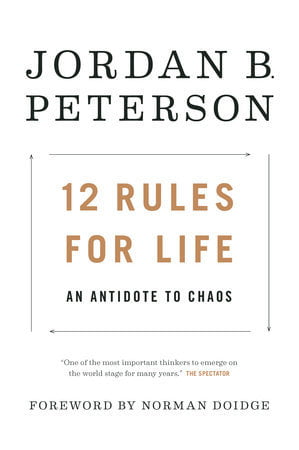Epic Psychotherapy is an NDIS Provider. Please read our Complaints Management and Resolution System, Policy Document Here

Review: 12 Rules for Life: An Antidote for Chaos
Author: Jordan B Peterson
Those who agree with Jordan Peterson describe his work as basic common sense; those who disagree describe him as a stupid person’s smart person. I am a fan, and I hope I am not stupid. I have spent a lot of time this year listening to his University Lectures. What he says seems right to me regarding the reality of living a good life.
He challenges a lot of contemporary liberal assumptions, in favour of older truths about how one should go about life. Last year I read “The Red Queen: Sex and the Evolution of Human Nature” and my most basic takeaway point was that a lot of the older truth’s about human nature are more true than Post Modernist truth. Peterson reiterates this, and I still agree. Do not follow the old truth’s (common sense) about how to live a good life at your own peril. It is easier to fix what you are doing in the world than change the world to suit your beliefs about it.
I think nihilism is factually and philosophically correct. No matter what good it evil we do it will have zero effect on the Universe. However, stopping your thoughts with nihilism is not psychologically healthy. We have not evolved to be nihilistic – it is not a healthy part of our nature. If the ancestors accept nihilism on mass, we would not be here. I think the healthiest response to nihilism is to accept its truth but immediately reject its implications.
My learning and experience from being a Mental Health Nurse has empathised with the importance of purpose. Peterson’s main message is accepting purpose and responsibility in your life. His understanding of good (anything you do to reduce the suffering of yourself or another) and evil (anything you do to increase the suffering of yourself or another) is as articulate, correct, and clear as any I have read.
I think missing from Peterson’s work is an acknowledgement of Mythos as a way of knowing. This seems to be what he is writing about, but I do not think I have ever heard him say the word Mythos. He tries to frame everything in Logos. In this, he seems to be conceptually wrong as I understand. At times he never lets the story get in the way of a good meta-story. Hansel and Gretel seem to be the best example. He has both Hansel and Gretel being treated well by the witch in order to fatten them up. My recollection was that Hansel was fattened up to be devoured, and Gretel became a domestic servant. However, I agree with his conception of the Devouring Mother.
My impression is that Peterson is more a Theologian than a Scientist. His skill is including great works of Art and Literature in a theological construct (which I believe is entirely appropriate). Like any great Theologian, his interpretations of Art are important, but his will never be the last word. If anyone else has something important and worthy to say about the meaning of Pinocchio that goes beyond Peterson I am sure it would be welcomed by him. My other favourite Theologian Karen Armstrong wrote of how young Rabbis would be applauded for finding a new meaning to an old story. Peterson is such a Rabbi. To me, he is the latest of a line of thinkers whose work seems important to me. Frankl, Becker, Peck, and now Peterson.
Call Lifeline 13 11 14
Call Emergency Services 000

Epic Psychotherapy will return calls, emails, or text messages within 24 hours. If you are in a crisis Epic Psychotherapy encourages you to seek help.
Epic Psychotherapy is an NDIS Provider. Please read our Complaints Management and Resolution System, Policy Document Here
© Epic Psychotherapy Townsville, Queensland
Designed & Managed by Oraco Solutions Limited
| Cookie | Duration | Description |
|---|---|---|
| cookielawinfo-checkbox-analytics | 11 months | This cookie is set by GDPR Cookie Consent plugin. The cookie is used to store the user consent for the cookies in the category "Analytics". |
| cookielawinfo-checkbox-functional | 11 months | The cookie is set by GDPR cookie consent to record the user consent for the cookies in the category "Functional". |
| cookielawinfo-checkbox-necessary | 11 months | This cookie is set by GDPR Cookie Consent plugin. The cookies is used to store the user consent for the cookies in the category "Necessary". |
| cookielawinfo-checkbox-others | 11 months | This cookie is set by GDPR Cookie Consent plugin. The cookie is used to store the user consent for the cookies in the category "Other. |
| cookielawinfo-checkbox-performance | 11 months | This cookie is set by GDPR Cookie Consent plugin. The cookie is used to store the user consent for the cookies in the category "Performance". |
| viewed_cookie_policy | 11 months | The cookie is set by the GDPR Cookie Consent plugin and is used to store whether or not user has consented to the use of cookies. It does not store any personal data. |